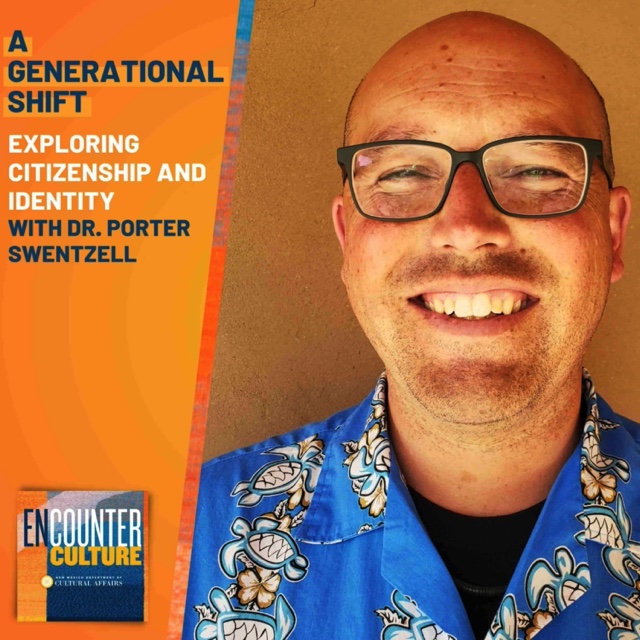The relatively new political philosophy by which the United States governs its people differs quite radically from how Native people have governed themselves for millennia. That said, Indigenous folks who are members of federally recognized tribes can participate in elections for both. How do they maintain tribal sovereignty while engaging in Western-style democracy––a system with a historically poor track record regarding Indian affairs? And how do they convince fellow tribal members that it’s in their community’s best interest to vote?
Welcome to the fourth episode in Encounter Culture’s collaboration with the New Mexico History Museum exploring Indigenous voting rights before and after Trujillo v. Garley. If you’ve never heard of the case or the inspiring story of Miguel Trujillo, we encourage you to check out the last three episodes. Then join host Charlotte Jusinski and co-host Stephanie Padilla as they learn about the complicated realities surrounding Indigenous suffrage with Dr. Porter Swentzell (Santa Clara Pueblo), executive director at Kha’p’o Community School, tribal leader, and invaluable consultant on this project, and June Lorenzo, (Laguna Pueblo and Navajo/Diné), and chief judge of Pueblo of Zia.
Voter participation often begins with a simple question: Why should I bother? For Indigenous people, the answers come tangled in hundreds of years of broken treaties, systemic racism, and voter access restrictions like those that Miguel Trujillo fought to overturn. “We identify ourselves by who we are as Indigenous nations,” says Porter. “And [we’ve] been deeply impacted by colonialism.” And yet, Porter challenges the notion that engaging with the colonizer’s process can’t work in tribes’ favor.
Judge Lorenzo agrees. In addition to her court and private practice duties, she advocates internationally on human rights issues for Indigenous people. “I think it’s really important to participate fully in voting.” She is sensitive to the complexities of decision-making as both a tribal member and a citizen of the United States. To that end, Judge Lorenzo works tirelessly to connect with Indigenous voters and ease their way once at the polls.
So, why do Indigenous folks bother to vote? “For that ultimate goal of perpetuating who we are,” says Porter, “[and] protecting all of the things that we hold dear.”
QUOTES
Dr. Porter Swentzell
“The story of Miguel Trujillo is also a powerful story as well. You can see that sort of shift where there’s interest in telling that story and sharing that story,”
“Our way of organizing ourselves has been always about shared identity, shared culture, shared history––that nation idea.”
“We might sit in our modern-day seats and not quite see it quite in the same way, but for a lot of people in the early 1900s, citizenship meant giving up your citizenship to your nation and then creating the situation where your nation could be destroyed.”
“We have a responsibility that comes from the beginning of time, to serve not just the people, but the place as well.”
“As more Native people vote, then the impact is not just on having a voice heard at the polls, but also of having that impact on those who are making the decisions on the political level.”
June Lorenzo
“You should be able to use your first language when you do this. You don’t need to use English to vote.”
Visit http://newmexicoculture.org for info about our museums, historic sites, virtual tours, and more.
Encounter Culture, a production of the New Mexico Department of Cultural Affairs, is produced and edited by Andrea Klunder at The Creative Impostor Studios.
Hosted by Stephanie Padilla (Isleta, Laguna, Cochiti) & Charlotte Jusinski, Editor at El Palacio Magazine
Technical Director & Production Audio: Edwin R. Ruiz
Recording Engineer: Kabby at Kabby Sound Studios in Santa Fe
Executive Producer: Daniel Zillmann
Consulting Producer & Editor: Monica Braine (Assiniboine/Lakota)
Associate Producer & Editor: Alex Riegler
Show Notes: Lisa Widder
Social Media Design: Caitlin Sunderland
Theme Music: D’Santi Nava
Instagram: @newmexicanculture
For more, visit podcast.nmculture.org.
Special thank you to Clark Tenakhongva, along with Gary Stroutsos and Matthew Nelson, for the incredible Hopi music featured throughout all 6 episodes of this season. Their new album Hon Muru is set to release in August 2023 and will be available for purchase along with their other recordings on Bandcamp and at ongtupqa.com.
This season was made possible due to the generosity of the National Endowment for the Humanities and the family of Miguel and Ruchanda Trujillo.


